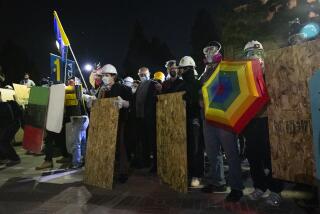An Exhausted Arafat Is Greeted by Crowd
RAMALLAH, West Bank — Cheering, whistling and honking car horns, hundreds of jubilant Palestinians swarmed in the dead of night to the wrecked buildings where Yasser Arafat had lately been staring down Israeli tanks.
They had to wade through a sea of churning dust, step past the shells of crushed cars and avoid the barbed wire left behind when Israeli troops evacuated the premises less than an hour before.
There, on the front steps of what’s left of Arafat’s compound, the crowds joined with a small contingent of Palestinian policemen and a motley crew of international peace activists, all of whom were enjoying their first minutes of freedom after spending weeks trapped with Arafat.
“I feel free! I feel victorious!” declared Rashid Hilal, a journalist with Voice of Palestine radio who had shown up for work the morning of March 29 to cover the start of Israel’s invasion of Ramallah and ended up being caught inside.
With a new beard and clothes a little looser, Hilal emerged with a roll of papers under his arm, notes he had kept as a daily diary, which he sometimes telephoned out to listeners.
The ordeal, he insisted, was worth it “because we showed that the Palestinian people have steadfasted.” He used the word that has become a verb in the Palestinian lexicon--”to steadfast.”
But steadfasting can be a messy thing, and inside the three-story building where Arafat and a couple of hundred other people spent most of their time, there were the signs and smells of life under siege. Crumpled mattresses and blankets lined a corridor; floors were sticky and trash was strewn everywhere.
Arafat awaited the reporters who also rushed the compound. He sat at a long table flanked by aides and guards. He appeared enraged, yelling at his questioners for focusing on him instead of Bethlehem and branding the Israelis everything from terrorists to Nazis.
“How could the world possibly be silent about this atrocious crime,” he said. “I don’t care if this room I’m sitting in blows up. What concerns me is what is happening at the Church of the Nativity. This is a crime that cannot be forgiven.”
Hundreds of Palestinians have been holed up in the Bethlehem church for a month after rushing inside to escape Israeli troops.
Arafat turned on the journalists.
“Go away, all of you. Go and tell the world about this crime. Don’t talk to me,” he said, before his aides took him away.
He calmed later, and as angry as he had been, he also clearly relished the moment. As tired as his aides insisted he was--and he did look exhausted and pale--he continued to receive well-wishers and journalists well into the wee hours of the morning.
He later told an interviewer that he planned to tour the sites of Israeli destruction in the West Bank, the results of a monthlong offensive launched by Israel after a wave of deadly suicide bombings aimed at Israelis.
The crowd on the front steps, meanwhile, celebrated and struck a defiant note. Uniformed policemen waved their AK-47s and kissed and embraced each other and friends who arrived. They mostly seemed glad it was all over.
They told of surviving on rations of bread or water, less or more depending on what the Israelis delivered.
In short order, Palestinian backhoes were tearing down barbed wire and clearing the huge dirt-and-debris barriers that Israeli forces had placed to block many of the roads in Ramallah, especially the ones leading to the compound.
More to Read
Sign up for Essential California
The most important California stories and recommendations in your inbox every morning.
You may occasionally receive promotional content from the Los Angeles Times.











